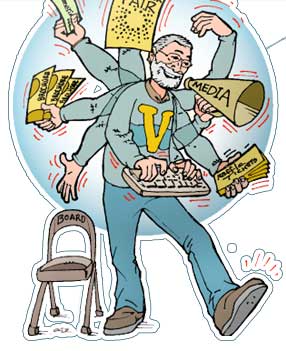








Merits of Buy Nothing Day
Brandon Sun “Small
World” Column, Monday, November 25 / 13
Zack Gross
Zack Gross
At a time of year when many of us are focusing on shopping, along comes Buy Nothing Day, telling us that our consumer habits are the cause of a host of ethical, social and environmental problems that hurt our planet and its people. Our economic and political leaders, meanwhile, will tell us that shopping is the best things we can do to create jobs and wealth.
The first Buy Nothing Day was the brainchild of a Vancouver ad executive and was picked up by Adbusters magazine, a counter-culture publication particularly popular with young people. November 29th, the last Friday of the month, is Buy Nothing Day in North America, whereas it is held the next day in Europe.
Can people switch off their shopping, even for one day? The Buy Nothing website tells us that their designated day is not anti-holiday or anti-independent business. Rather, its aim is to point out that our rich world – 20% of the earth’s population – consumes over 80% of the world’s resources. If all of the globe’s population consumed like Canadians do, we’d need at least four planets!
The issues that arise include exploitation of agricultural land, mineral resources and Third World labour by large companies, causing poverty, pollution and conflict. The jewelry you buy at this time of year might be conflict diamonds from the Democratic Republic of Congo. The cut flowers you buy might have been grown by underpaid workers in Kenya whose land has been switched to producing our flowers instead of their food, and whose aquifers are being drained for irrigation.
Unnecessary packaging, in which most holiday gifts are wrapped, amounts to massive mountains of garbage even where recycling efforts are strong. The many items that are purchased and then discarded after a day’s use clogs our homes and ultimately our nuisance grounds. The people who make our toys, clothes and other gift items often cannot themselves afford what they make for us. Few safeguards are in place to protect these people and their environment.
So, what can we do? Here are a few tips to consider, in part from an article entitled “How to Buy Nothing”:
• Don’t be swayed by commercial advertising. Estimates are that $370 for each of our 33 million Canadians is spent by advertisers every year to get us to buy their products. The amount of money spent by the rich world on cosmetics, cigarettes, soft drinks, ice cream, pet food and weapons dwarfs the amount we earmark to deal with the many challenges our world faces.
• Consider: Is shopping a habit or a way out of boredom? Go out for coffee or to a movie instead.
• If you like to shop, what about flea markets, thrift shops and garage sales where you don’t have to buy new, expensive items?
• Just stay home (and play a board game). Or use your usual shopping time to visit friends, take on home projects or join groups in your community.
• Leave most of your money at home when you go out. If you don’t have it, you can’t spend it! Nothing is more seductive than a credit card when it comes to spending money you don’t have on things you don’t need! Some websites suggest freezing your credit card in a block of ice!
• Create and stick to a personal budget. Nothing is more discouraging than those bills that arrive in January!
• Make a shopping list and stick to it. Think about what you really need and what you already have (hanging unused in your closet for the past year).
• Repair rather than replace. Or buy for durability. Don’t “upgrade” unless you need to. Is the eight-slice toaster really better than the four-slice one?
• Where possible, consider sharing the cost of larger ticket items. You have a lawn mower and your sibling or neighbor has a snow-blower – is there an opportunity there?
• Favour independent stores rather than malls and the chain stores in them.
• Don’t jump into a purchase. If you really like something expensive, wait a few days to consider whether you really want to buy it. Spend time rather than money by looking around for the best deal.
• Buy handmade items from local or global artisans, or make gifts yourself. They could be food items (jams or herbs, for instance) or crafts. Growing your own garden will save you money and also yield potential gift items. Don’t just buy something that has no real significance because you need to give a gift.
• Tax yourself. Every time you buy, put 10% equivalent into a savings account for that rainy day or something personally significant.
• When shopping, look for organic, fair trade and other environmentally and socially progressive labels. Doing the right thing is good for business, too!
It’s not Have Nothing or Give Nothing Day. Buying and consuming less is a gift to the planet and an opportunity to think through what is important to you as a mindful consumer. Have a Happy Buy Nothing Day on November 29th!
Zack Gross works for the Manitoba Council for International Co-operation (MCIC), a coalition of more than 40 international development organizations.
* * * * *
Return to Articles page
Return to Articles page